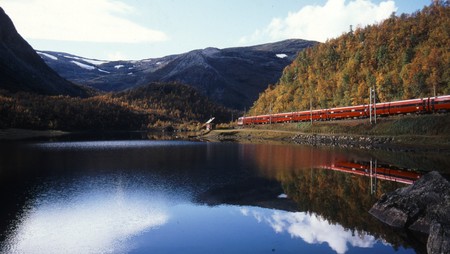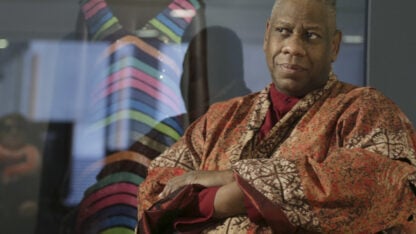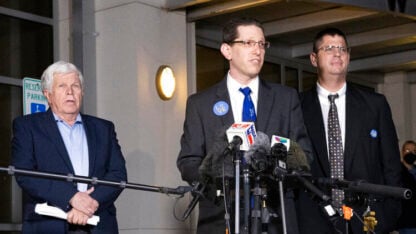NPR’s ‘Invisibilia’ Podcast Producer Abby Wendle Explains Norwegian ‘Slow TV’

The Norwegian program “Slow TV” is a stress-free way of watching television.
Slow TV
NPR’s “Invisibilia” podcast dives into the hidden forces that influence human behavior. The podcast’s topics go deep into psychology, offering perspectives on the way we think and behave that never occur to most. A recent episode, “The Great Narrative Escape,” focused on the Norwegian television program “Slow TV,” a show that, to many Americans, would sound like impossibly boring programming. It’s an enormous hit in Norway, however. “Invisibilia” producer and journalist Abby Wendle joined “City Lights” senior producer to talk about the episode she pitched and researched, and the surprising fascination of “Slow TV.”
Wendle has reported for “Invisibilia” for six years. When she found out about Norwegian “Slow TV,” it didn’t occur to her that that was the story the producers would run with. “I had heard about ‘Slow TV,’ and was like, ‘That’s funny, that’s interesting,’ and I pitched it kind of as a joke… I did not think that it would get greenlit at all,” said Wendell.
“Norwegian ‘Slow TV’ is basically programming that goes on for hours… and sometimes even days, and I think actually there have been broadcasts that have gone on for longer than a week. It’s uninterrupted by commercials or breaking news, and it’s video of really mundane activities. So, the first couple of programs that they broadcast were of train journeys across Norway,” said Wendle. “They’ve done things like knitting and fishing, and there was a beautiful one of a reindeer herd migration.” “Slow TV’s” broadcasts have no scripting, no narratives, and no action – at least, not intentionally.
Wendle compared “Slow TV” to the work of the avant-garde American composer John Cage, citing his piece “433,” “where he basically walked out onto the concert stage, sat down at the piano, lifted the lid to the keys, and then did nothing for four minutes and 33 seconds… One of the things that he was doing was playing around with control and agency, like the composer trying to take control away from himself.”
To Wendle, Cage’s unconventional approach spoke, like “Slow TV,” of an intention to leave interpretation up to the audience. “They can think for themselves,” said Wendle. “You don’t have to shove meaning down their throat for them, and how can we make media that engages that kind of individual thinking in the audience? ….For me, “Slow TV” seemed to be playing around in that space.”
For the podcast, Wendle interviewed “Slow TV” producer Thomas Hellum, who insisted that “‘Slow TV’ is not art.” Wendle also added, “It’s not something to put you to sleep, so it’s not like a meditation app, or something like that. He was adamant that it was storytelling.” So Wendle decided to try the show out on audiences made up of her friends, and see what the unique programming felt like to them.
Their reactions shared a theme. “The answer that I got again, and again, and again, was that it elicits the impulse to create a story from it, in the person who’s watching it,” said Wendle. “The experience of it is very much a narrative experience, even though ‘Slow TV’ is itself, what some people would call ‘weak narrativity.’”
Eager for a deeper interpretation, Wendle contacted Josh Cohen, psychoanalyst and professor of literary theory at Goldsmiths University of London. He said, “What a weak narrative does, is it hands your mind back to you…. ‘Slow TV’ might be a kind of apprenticeship in looking without that kind of immediate focus – in saying, ‘What would be like to look ahead, and ask myself what it is I’m interested in, rather than have it assumed for me?’”
As “Slow TV” kept releasing its special variety of “entertainment,” it surprised everyone and amassed throngs of rapt viewers, becoming a major buzz within the community. Fans would even follow the actual events in real life, such as the ferry ride broadcast, throwing “port parties” on the docks where the ferry was passing. “It was really successful, like an astonishingly successful public art,” said Wendle.
The “Invisibilia” podcast took a moment to explore the question of whether “Slow TV” would work in America. The common response Wendle got from media experts she interviewed seemed to be frankly, and universally, negative. Unsatisfied, she turned to psychologists, who were more open to the possibility that Americans might have an appetite for “slow” programming. But Wendle agreed with most of her interviewees that the major problem with getting something like “Slow TV” to American markets was the commercial media landscape – specifically, commercials. “You just have to have commercials. And if you have commercials, then it makes the experience of watching ‘Slow TV’ not quite the same… Capitalism is ruining the vibe, y’all.”
Norway’s television media, publicly funded and without the need for consistent ad breaks, takes advantage of its freedom to experiment, Wendle explained. “They see it as a public duty to try and create the things that are not going to be monetarily successful because everything that exists should not be guided by whether or not it’s going to be profitable.”
It seemed that the result of such freedom to experiment was a community united by excitement about its own ordinary moments. “What people were celebrating in part, at least from my perspective as an American, was just the beauty of the natural world. And like, what an amazing thing to be on the face of the planet,” said Wendle.
Still fascinated by the phenomenon of “slow media,” Wendle took the liberty of creating another new episode for “Invisibilia” called “American Slow Radio.” It’s a 41-minute recording of Americans sitting together, watching Norwegian “Slow TV,” and reacting – Wendle’s answer to the challenge, “is it possible to tell a boring story that will keep people listening?”
Listeners can find out for themselves at www.npr.org/2021/06/10/1005166521/american-slow-radio.
Watch some of Norway’s “Slow TV” at www.nrk.no/presse/slow-tv-1.12057032.
Invisibilia’s episode, “The Great Narrative Escape”, can be heard here: www.npr.org/2021/05/19/998228413/the-great-narrative-escape.








